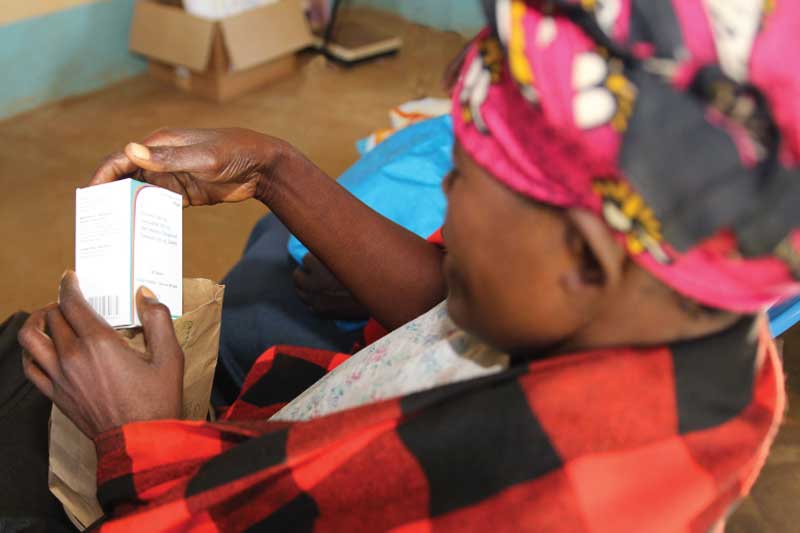It is a chilly morning at the Othaya Sub County Hospital.
The dullness accompanied by a slight drizzle has not dampened the spirits of the patients seated patiently outside the Comprehensive Care Centre (CCC) clinic, waiting to honour their appointments. As each of them waits their turn to see the doctor, a peer educator and a health care worker take them through a group psychosocial support session. During such sessions, the patients raise and discuss issues they face in their treatment journey.
Today is a big day, a group of over 60 patients is set to graduate from an eight-month treatment literacy course. CHS developed the treatment literacy program as one of the retention and adherence support strategies for newly enrolled clients and those with high viral loads. Enrolled clients are provided with health education covering a variety of topics that help them adhere to their treatment leading to better health outcomes, translating to improved quality of life. After graduation, the client is either linked to a community-based system or joins a facility-based support group for continued support and mentorship.
Simon’s Story
“I travel from Nairobi every month to Othaya Sub County Hospital for my appointments. There are many hospitals in the city but the specialized care and information I have received from the team here is incomparable to any other,” said 35-year-old Simon Wako* a beneficiary of the treatment literacy course.
Simon had been experiencing weight loss, fatigue, chest pains and lower back pain for a few weeks when he finally decided to see a doctor. “The doctor prescribed antibiotics and painkillers and advised me to rest,” he said. Given his role as an Operations Manager at the time, he was certain the doctor was right as he had been overworking himself. However, his situation did not improve despite faithfully taking his medication as prescribed.
“It had become rather obvious that I was losing a remarkable amount of weight and I was looking sickly, my employer expressed his concern and advised me to seek a second opinion which I did and my life has never been the same since,” he said, as if replaying the events of the said day. It was on this day that he discovered he was HIV positive, although he received the news from the counsellor quite well, he was devastated on the inside.
“I was taken through the counselling session, but nobody bothered to give me information on my treatment like the importance of adhering to my medication and taking my drugs at the prescribed time,” he says as he shakes his head.
He would take his medication on and off without understanding the implication of his actions. His health continued to deteriorate. “I went to the hospital every month for my appointments all along acting as though everything was well but obviously, my body was telling a different story. I was devastated,” he said.
He had only disclosed his status to his brother who advised him to visit the sub county hospital near their rural home in Othaya. “I was a bit adamant and afraid of bumping into people I know at the hospital, but my brother insisted, and I am glad he did,” he said.
Changing Tides
“When Simon came to this facility he weighed 32 kilograms and could barely walk. I look at him now and I am encouraged by his improved health. Despite his state, he never felt sorry for himself he attended all his clinic appointments and the treatment literacy classes without fail,” said Titus Maingi, a Clinician at the Othaya Sub County Hospital.
Close to a year after his first visit to the facility, Simon now weighs 50 kilograms and has attained viral suppression. He is glad he enrolled into and successfully completed the treatment literacy course. “I have learned so much on how to take care of myself, diet and nutrition, the importance of adhering to my medication, never missing a day’s medication and appointments. I actually attribute my improved health to the literacy course and the dedicated support and care from the team here. It does not stop here. I will share this information with others,” he said.
With funding from the US President’s Emergency Fund for AIDS Relief (PEPFAR) through the US Centers for Disease Control and Prevention (CDC), the CHS central region project TEGEMEZA (October 2011 to March 2017) and the follow-on project TEGEMEZA Plus have conducted over 700 treatment literacy classes for over 7,000 clients to date. Of these, 6,800 have successfully completed the classes.
Within the treatment literacy classes, there is the formation of treatment buddies whose roles are to offer adherence support at community level, to monitor each other’s clinic appointments and support the health facility in tracing defaulters. Graduates are linked to existing treatment support groups, and this ensures that there is continued support and monitoring of the clients even after they graduate.
*Name changed to protect patient’s identity


